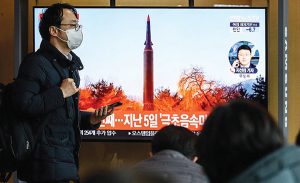Bloomberg
Flights out of some airports on the US West Coast were briefly halted by aviation regulators as a precaution after North Korea launched a high-speed missile in a test.
The so-called ground stop, which paused departures from an unspecified number of airports, lasted less than 15 minutes. North Korea’s missile flew at almost 10 times the speed of sound into waters off its eastern coast, ratcheting up tensions in the region and with the US.
The Federal Aviation Administration issues ground stops routinely to ensure airports and high-altitude flight paths remain orderly. They can occur for weather, volcanic eruptions or any number of reasons. On Monday afternoon, for example, the FAA ordered a brief halt to flights in the central region of the US as a result of aircraft volume related to the college football championship game in Indianapolis.
While they didn’t recall prior halts on US flights related to a North Korea launch, two experts in air traffic said it wasn’t surprising that the FAA and the US military had a system in place to raise alerts for such events.
The air-traffic system is built to handle unusual situations that might put planes in peril, said Dave Canoles, a consultant who formerly served as FAA’s director of air-traffic safety oversight. If there are any doubts, controllers and managers are trained to slow down the flow of planes until they can better understand the risks, Canoles said.
“It shows that the overall system is monitoring and attuned to world events,†said John Hansman, a aerospace professor at the Massachusetts Institute of Technology. “The overall harm is low†to halting flights for a short period, Hansman said.
White House Press Secretary Jen Psaki addressed the FAA action during a briefing Tuesday.
 The Gulf Time Newspaper One of the finest business newspapers in the UAE brought to you by our professional writers and editors.
The Gulf Time Newspaper One of the finest business newspapers in the UAE brought to you by our professional writers and editors.
